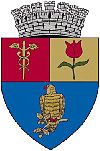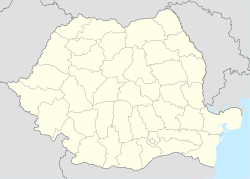Piteşti
| Pitești | ||
|---|---|---|
| County capital | ||

View of the central square with the Art Gallery on the right side of the picture and the City Hall building on the left side.
|
||
|
||
| Location of Pitești | ||
| Coordinates: 44°51′38″N 24°52′4″E / 44.86056°N 24.86778°ECoordinates: 44°51′38″N 24°52′4″E / 44.86056°N 24.86778°E | ||
| Country |
|
|
| County | Argeș County | |
| Status | County capital | |
| Government | ||
| • Mayor | Constantin Ionică (Social Democratic Party) | |
| Area | ||
| • Total | 40.7 km2 (15.7 sq mi) | |
| Population (2011) | ||
| • Total | 155,383 | |
| • Density | 3,800/km2 (9,900/sq mi) | |
| Time zone | EET (UTC+2) | |
| • Summer (DST) | EEST (UTC+3) | |
| Climate | Dfb | |
| Website | primariapitesti |
|
Pitești (Romanian pronunciation: [piˈteʃtʲ]) is a city in Romania, located on the Argeș River. The capital and largest city of Argeș County, it is an important commercial and industrial center, as well as the home of two universities. Pitești is situated in the historical region of Muntenia. It lies on the A1 freeway connecting the city directly to the national capital Bucharest, being an important railway junction, with a classification yard in nearby Bălilești. The city houses the Arpechim oil refinery, and is a marketing center for the automotive industry, in particular Automobile Dacia.
Inhabited since prehistoric times but first mentioned in the 14th century, it developed as a trading town in northern Wallachia, serving as an informal residence for various Wallachian Princes until the 18th century. From the 19th century and until the interwar period, it was an important political center for the National Liberal Party and the main residence of the Brătianu family of politicians. During the early stages of the communist regime, it was one of the main sites of political repression, with the Pitești prison becoming home to an experiment in brainwashing techniques.
...
Wikipedia


